Complete Solutions to Single Correct of chapter HEATING EFFECT OF CURRENT of Class 12 book with complete answers and questions
| Class 12 | PHYSICS |
| Chapter | HEATING EFFECT OF CURRENT |
| CENGAGE PHYSICS | Single Correct |
| Number Of Questions | 60 |
| Academic Year | 2023-24 |
The operating temperature of the filament of lamp is `2000^(@) C`. The temperature coefficient of the material of the filament is `0.005^(@) C^(-1)`. If the atmospheric temperature is `0^(@) C`, then the current in the `100 W - 200 V` lamp when it is switched on is nearest to
View SolutionIn the circuit in Fig. `7.27`, bulb `B` does not glow although ammeter `A` indicates that the current is flowing . Why does the bulb not glow?
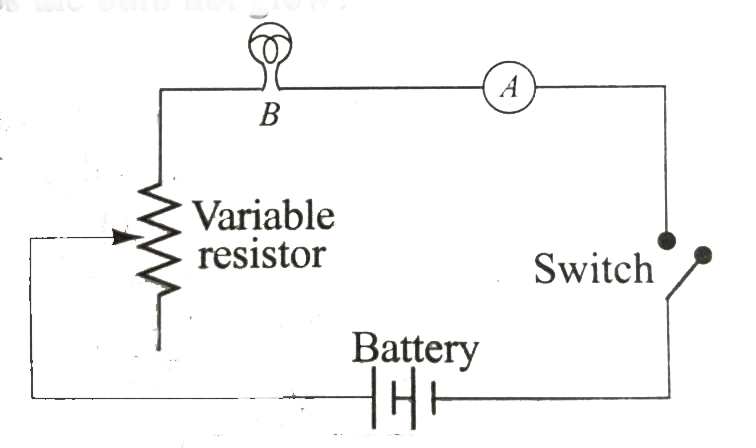
View SolutionThree bulbs `B_(1), B_(2) and B_(3)` are connected to the mains as shown in Fig. `7.28`. How will the brightness of bulb `B_(1)` be affected `B_(2) or B_(3)` are disconnected from the circuit?
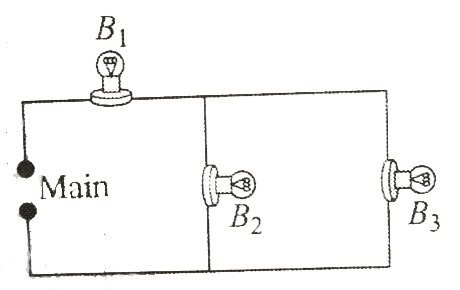
View SolutionThree identical cells , each having an `emf 1.5 V` and a constant internal resistance `2.0 omega`, are connected in series with a `4.0 omega resistor R`, first as in circuit (i) , and second as in circuit (ii) . Then
( power in R in circuit (i))/( Power in R in circuit (ii)) =
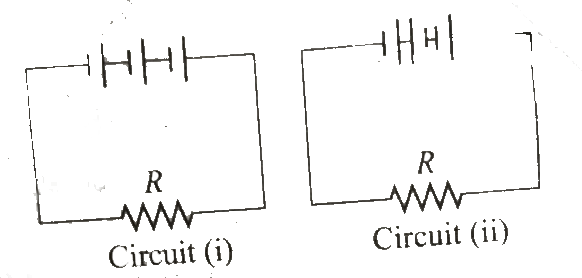
View SolutionAll bulbs in the circuit shown in figure are identical. Which bulb glows most brightly?
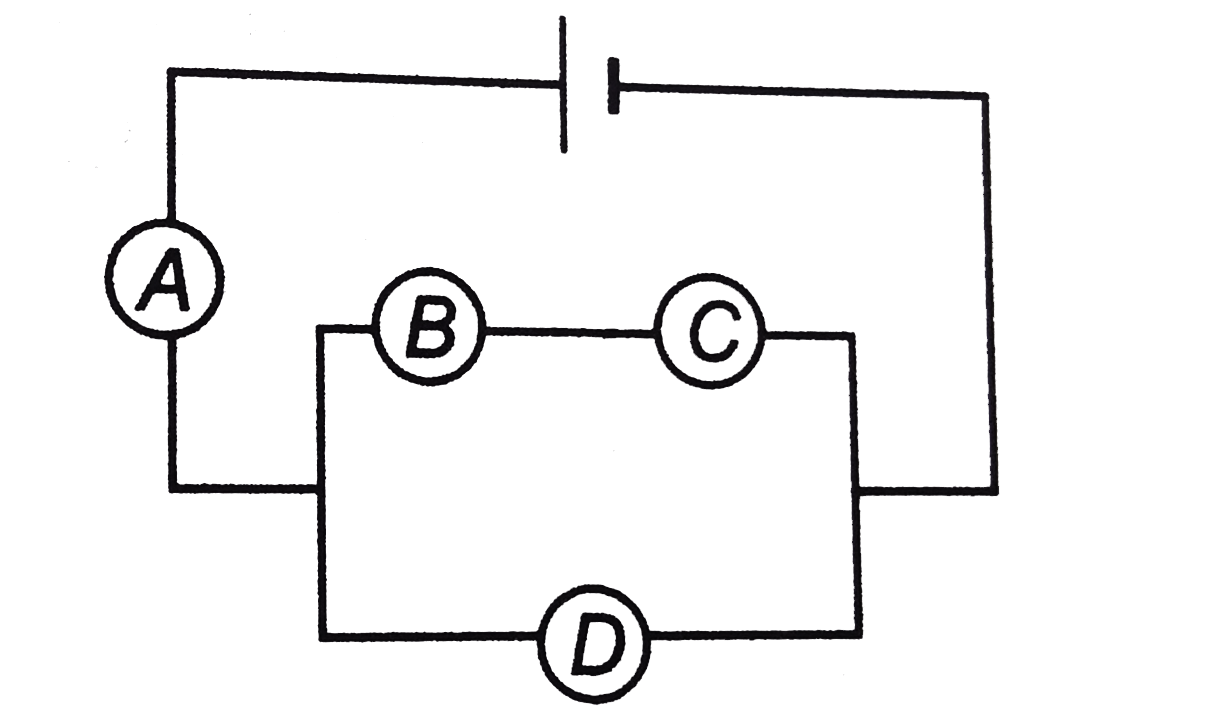
View SolutionWhich of two switches `S_(1) and S_(2)` shown in Fig. `7.31` will produce short - circuiting?
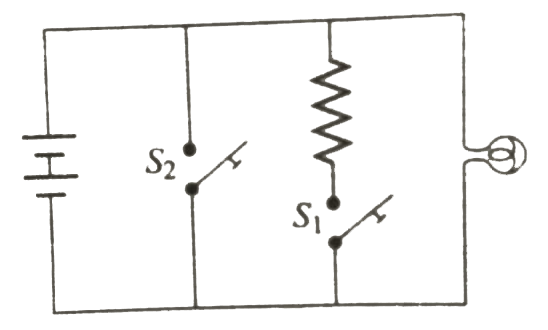
View SolutionThree similar light bulbs are connected to a constant to a constant voltage dc supply as shown in `Fig . 7.32`. Each bulb operates at normal brightness and the ammeter ( of negligible resistance) registers a steady current. The filament of one of the bulbs breaks. What happens to the ammeter reading and to the brightness of the remaining bulbs?
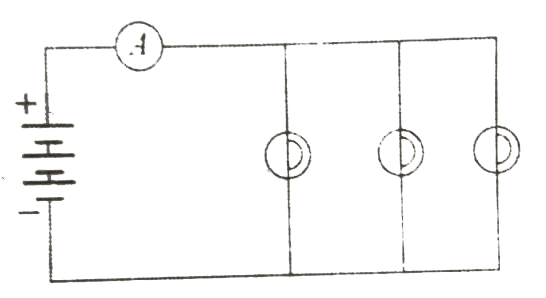
View SolutionThe circuit shownin Fig. `7.33` contains a battery , a rheostat , and two identical lamps. What will happen to the brightness of the lamps if the resistance of the rheostat is increased?
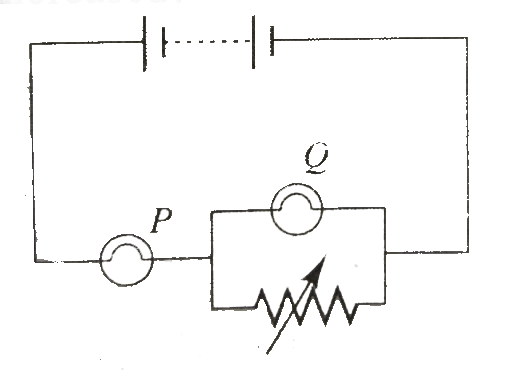
View SolutionA cell of internal resistances `r` is connected to a load of resistance `R` . Energy is dissipated in the load, but some thermal energy is also wasted in the cell. The efficiency of such an arrangement is found from the expression
( Energy dissipated in the load )/( Energy dissipated in the complete circuit)
Which of the following gives the efficiency in this case?
View SolutionTwo identical batteries each of emf `E= 2`volt and internal resistance `r=1` ohm are available `t`. produce heat in an external resistance by passing a current through it. What is the maximum power that can be developed across an external resistance `R` using these batteries?
View SolutionTwo similar headlight lamps are connected in parallel to each other. Together , they consume `48 W` from a `6 V` battery . What is the resistance of each filament ?
View SolutionTwo electric bulbs , rated for the same voltage , have powers of `200 W and 100 W`, respectively. If their resistances are `r_(1) and r_(2)` , respectively , then
View SolutionIf the current in an electric bulb decreases by `0.5 %`, the power in the bulb decreases by approximately
View SolutionAn electric bulb rated for `500 W` at `100 V` is used in a circuit having a `200 V` supply. The reistance `R` that must be put in series with bulb, so that the bulb delivers `500 `W is ……….`Omega`.
View SolutionA `1^(@) C` rise in temperature is observed in a conductor by passing a certain current . If the current is doubled , then the rise in temperature is approximately
View SolutionTwo electric bulbs have tungsten filament of same length. If one of them gives `60 W` and the other `100 W` , then
View Solution`n` identical light bulbs, each designed to draw `P` power from a certain voltage supply , are joined in series across that supply. The total power which they will draw is
View SolutionHow many calories of heat will be approximately developed in a `210 W` electric bulb in `5 min`?
View SolutionA constant voltage is applied between the two ends of a metallic wire . If both the length and the radius of the wire are doubled , the rate of heat developed in the wire will
View SolutionThe power rating of an electric motor that draws a current of `3.75 A`, when operated at `200 V`, is nearly
View SolutionA cable of resistance `10 Omega` carries electric power from a generator producing `250 kW at 10,000 V`. The current in the cable is
View SolutionIn the previous problem , the power lost in the cable during transmission is
View SolutionThe heat generated through `4 Omega and 9 Omega` resistances separately , when a capacitor pf `100 my F` capacity charged to `200 V` is discharged one by one , will be
View SolutionIf the length of the filament of a heater is reduced by `10%`, the power of the heater will
View SolutionA ` 2k W` heater used for `1 h` every day consumes the following electrical energy in `30 days`
View SolutionTwo cells , each of `emf E` and internal resistance `r`, are connected in parallel across a resistor `R`. The power delivered to the resistor is maximum if `R` is equal to
View SolutionA constant voltage is applied between the two ends of a uniform metallic wire. Some heat is developed in it. The heat developed is doubled if
View SolutionA given resistor cannot carry currents exceeding `20 A`, without exceeding its maximum power dissipaation ratings . By forced air cooling suppose that we increase the rate at which heat can be carried by a factor of `2`. Now the maximum current that the resistor can carry is
View SolutionA wire when connected to 220 V mains supply has power dissipation `P_1`. Now the wire is cut into two equal pieces which are connected in parallel to the same supply. Power dissipation in this case is `P_2`. Then `P_2: P_1` is
View SolutionA 220 volt, 1000 watt bulb is connected across a 110 volt mains supply. The power consumed will be
View SolutionA heater coil is cut into two equal parts and only one part is now used in the heater. The heat generated will now be
View SolutionThree `10 Omega , 2 W` resistors are connected as in Fig. `7.34`. The maximum possible voltage between points `A and B` without exceeding the power dissipation limits of any of the resistors is

View SolutionA torch bulb rated `4.5 W, 1.5 V` is connected as shown in Fig. 7.35. The emf of the cell needed to make the bulb glow at full intensity is
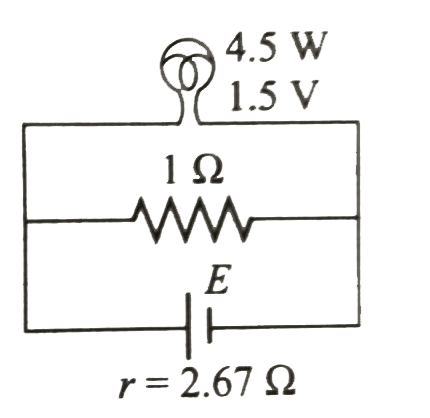
View SolutionA heater is designed to operate with a power of `1000W` in a `100 V` line. It is connected in combination with a resistance of `10 Omega` and a resistance `R`, to a `100 V` mains as shown in figure. What will be the value of `R` so that the heater operates with a power of `62.5W`?
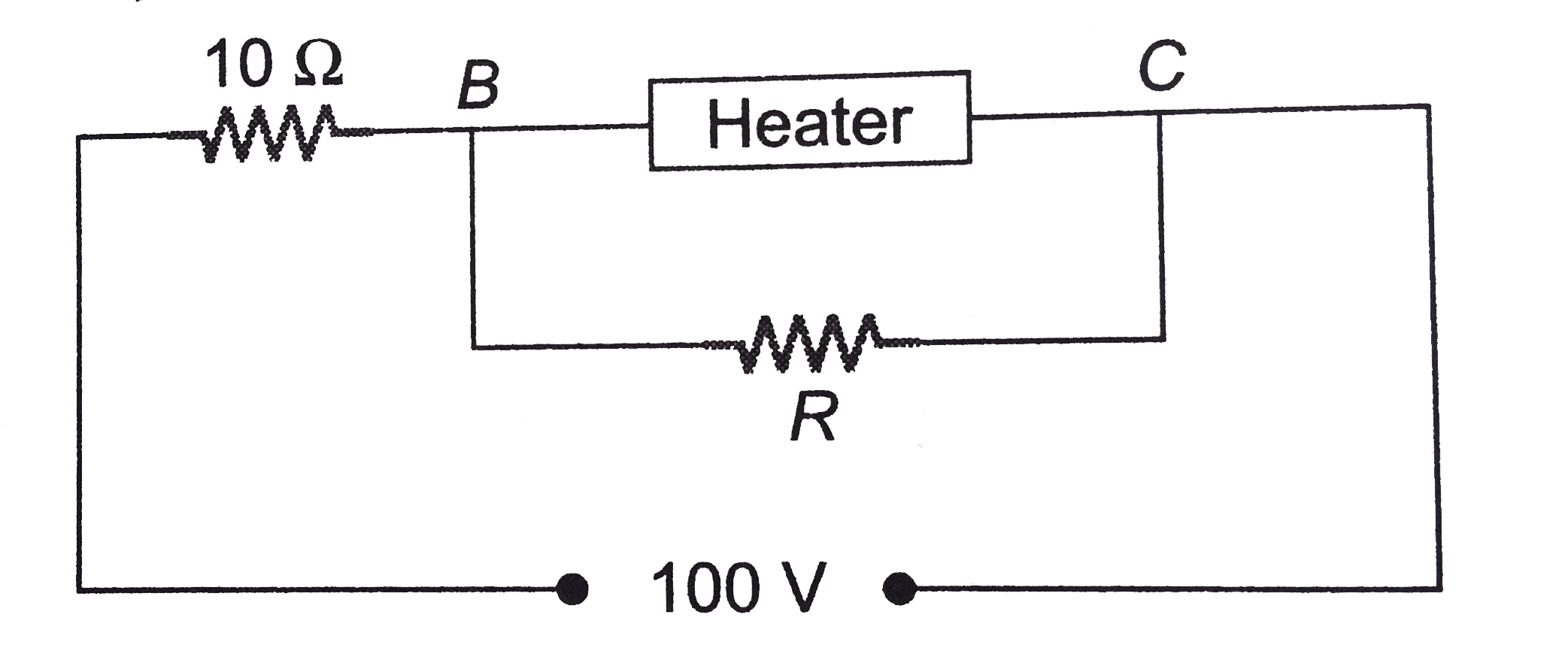
View SolutionThe supply voltage to room is 120 V. The resistance of the lead wires is `6Omega`. A 60 W bulb is already switched on. What is the decrease of voltage across the bulb, when a 240 W heater is switched on in parallel to the bulb?
View SolutionFigure `7.37` shows a network of three resistances. When some potential difference is applied across the network , thermal powers dissipated by `A, B and C` are in the ratio
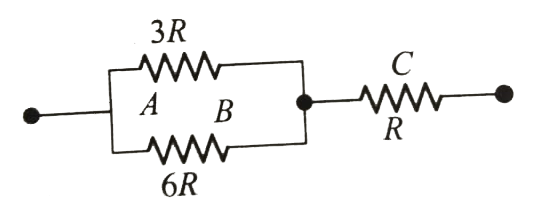
View SolutionResistors `P , Q , and R` in the circuit have equal resistances. If the battery is supplying a total power of `12 W` , what is the power dissipated as heat in resistors `R`?
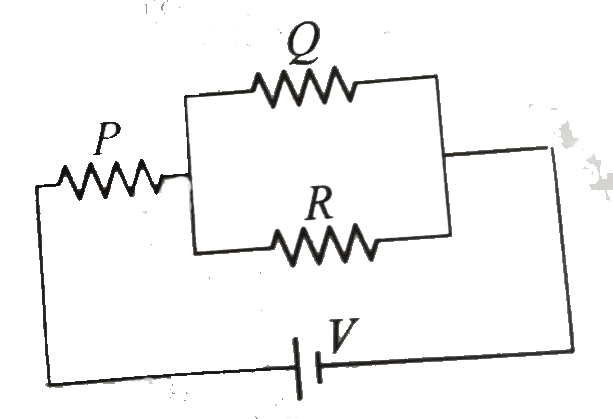
View SolutionThree bulbs of `40 W , 60 W and 100 W` are connected in series with a `240 V` source.
View SolutionIn the circuit shown in fig the heat produced in the 5 ohm resistor due to the current flowing through it is 10 calories per second.
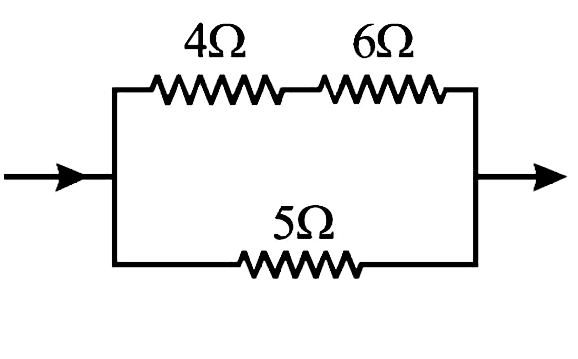
The heat generated in the 4 ohms resistor is
View SolutionA battery of internal resistance `4Omega` is connected to the network of resistance as shown . In order that the maximum power can be delivered to the network, the value of R in `Omega` should be
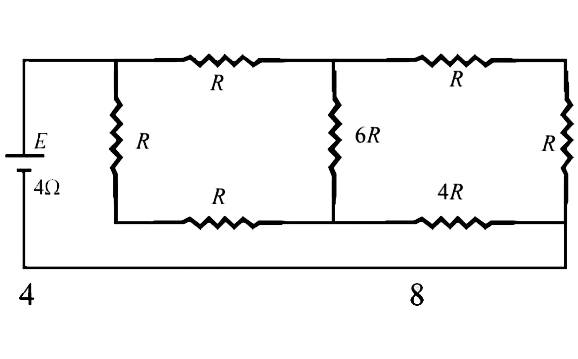 .
.
View SolutionFour resistances carrying a current shown in Fig. `7.41` are immersed in a box containing ice at `0^(@)C`. How much ice must be put in the box every `10 min` to keep the average quantity of ice in the box constant? Latent heat of ice is `80 calg^(-1)`.
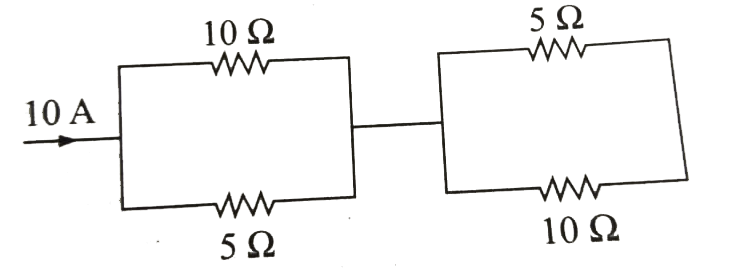
View SolutionThe three resistance of equal value are arranged in the different combination shown below. Arrange them in increasing order of power dissipation.
(I)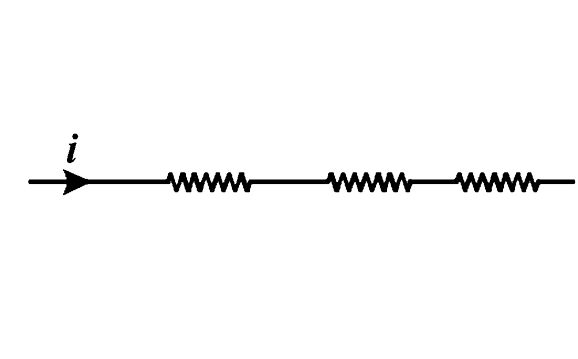 (II)
(II) 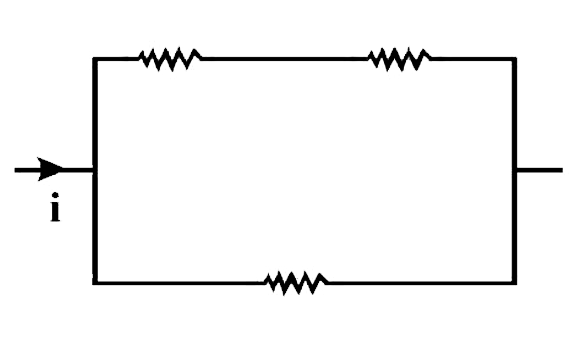
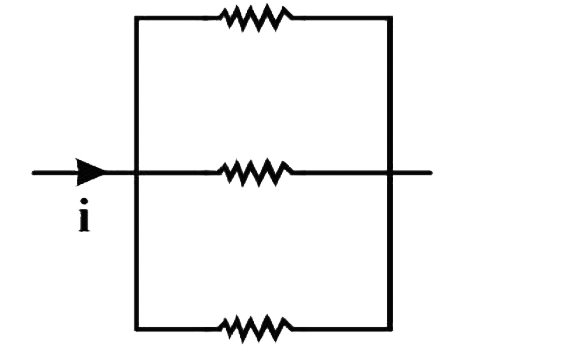 (IV)
(IV) 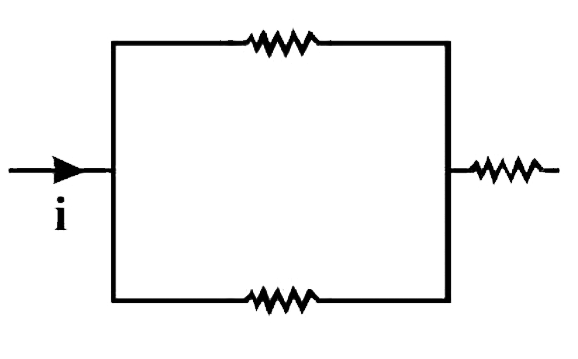
View SolutionAn ideal gas is filled in a closed rigid and thermally insulated container. A coil of `100Omega` resistor carrying current 1 A for 5 minutes supplies heat to the gas. The change in internal energy of the gas is
View SolutionThe resistance in which the maximum heat is produced is given by `( Fig. 7.43 )`
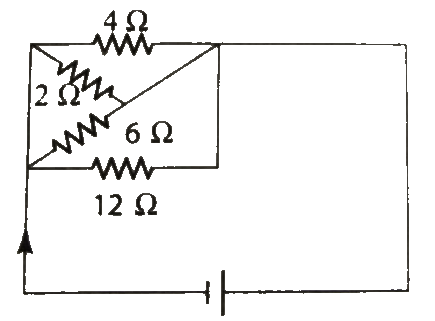
View SolutionThe resistance of hot tungsten filament is about 10 times the cold resistance. What will be the resistance of 100 W and 200 V lamp when not in use?
View SolutionThe resistance of the filament of a lamp increases with the increase in temperature. A lamp rated `100 W` and `220 V` is connected across `220 V` power supply. If the voltage drops by `10%`, then the power of the lamp will be
View SolutionA wire of length L and 3 identical cells of negligible internal resistance are connected in series. Due to the current, the temperature of the wire is raised by `DeltaT` in a time t. A number N of similar cells is now connected in series with a wire of the same material and cross-section but of length 2L. The temperature of the wire is raised by the same amount `DeltaT` in the same time t. the value of N is
View SolutionAn electric immersion heater of `1.08 kW` is immersed in water . After it has reaches a temperature of `100^(@)C` , how much time will be required to produce `100 g` of steam?
View SolutionTwo electric bulbs `A and B` are rated `60 and 100 W`, respectively. If they are connected in parallel to the same source , then
View SolutionA `25 W, 220 V` bulb and a `100 W , 220 V` bulb are connected in series across a `220 V` line , which electric bulb will glow brightly?
View SolutionTwo identical heaters rated `220 V , 1000 W` are paced in series with each other across `220 V` line , then the combined power is
View SolutionFigure `7.44` shows three similar lamps `L_(1) , L_(2), and L_(3)` connectged across a power supply. If the lamp ` L_(3)` fuses, how will the light emitted by `L_(1) and L_(2)` change?
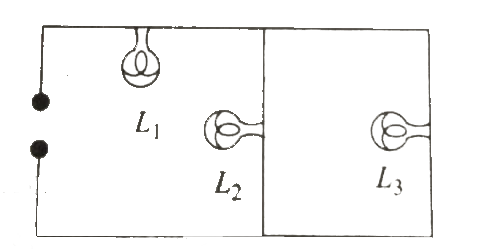
View SolutionIf a wire of resistance `20 Omega` is covered with ice and a voltage of `210 V` is applied across the wire , then the rate of melting of ice is
View SolutionHow many `60 W` lamps may be safely run on a `230 V` circuit fitted with a ` 5 A` fuse?
View SolutionIt takes `16 min` to boil some water in an electric kettle. Due to some defect it becomes necessary to remove `10 %` turns of the heating coil of the kettle . After repairs , how much time will it take to boil the same mass of water ?
View SolutionA electric kettle ( rated accurately at `2.5 kW`) is used to heat `3 kg` of water from `15^(@)C` to boiling point . It takes `9.5 min`. Then the amount of heat that has been lost is
View SolutionHow many `60 W` lamps may be safely run on a `230 V` circuit fitted with a ` 5 A` fuse?
View SolutionIf a given volume of water in a `220 V` heater is boiled in `5 min`, then how much time will it take for the same volume of water in a `110 V` heater to be boiled?
View SolutionThe charge flowing through a resistance `R` varies with time t as `Q = at - bt^(2)`. The total heat produced in `R` is
View SolutionA `100 W` bulb designed to operate on `100 V` is to be connected across a `500 V` source . Find the resistance to be put in series so that bulb consumes `100 W` only.
View Solution
Single Correct questions and complete solutions for chapter HEATING EFFECT OF CURRENT of CENGAGE PHYSICS (HINGLISH) of Class 12